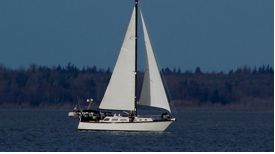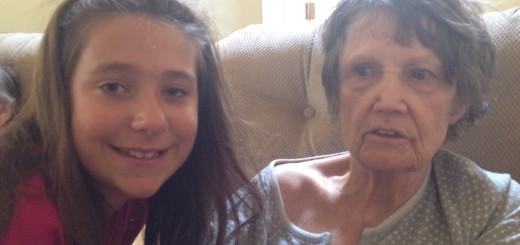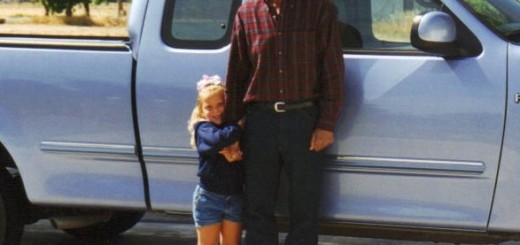I’ve shared my personal Alzheimer’s story a hundred times. On my walk webpage, on my facebook fundraising posts, in my personal emails to friends asking for donations and in person with people I meet everyday. I walk in memory of my mom, who died from Alzheimer’s 4 years ago.
But this week, I gained a new perspective on why my family walks and discovered another way for our family to share our story.

Sail + Give + Live
My sister Shannon is about to take a big leap in life – going from a comfortable home in Oakland to living on a 40-foot sailboat with her husband and two kids. We were all shocked to hear about this drastic move and their plans to pack up and sail around the world in two years. But Shannon started a blog, and after reading her story, I understand the decision and support it 100%. I know it won’t all be easy, but it will be an amazing experience.
My change of heart after reading Shannon’s blog reminded me of how important it is for us who have had experience with this disease to tell our story. I read the story from her perspective as a woman who lost her mom to Alzheimer’s and suddenly the big decision all makes sense.
Walkers can learn a lot from this principle. Did you know that people who add their story and a photo or video to their personal Walk fundraising pages raise more money than those who don’t? That is a tangible example of how stories will help us move this cause forward and I hope all of you share yours often.
For most participants, Walk to End Alzheimer’s isn’t just about raising funds and raising awareness – it’s personal. Every year I am drawn closer and closer to this cause by the stories I hear from walkers. As I hear each new story I add one more person to the list of people I walk for. Like the Scholz family from Santa Cruz, who I met at a kick-off last year, or the Lucas family who I met in my support group who walk in San Jose, or Team Redding from Sacramento who I met at our post walk party two years ago – all these people walking to end Alzheimer’s and making it personal. I fundraise for my family AND these families now. Have you told me your story yet? Click here to share your story or let us know in the comments!
Today, I’m inspired to tell my story in new ways – not only on my fundraising page, but maybe on my own blog, or in a video, or a newsletter to family and friends, or in my local paper. The power of these stories really can move this cause forward. Here’s a look at Shannon’s blog Sail + Give + Live. I hope it inspires you to live life to the fullest and tell your story!
Why? Part 1: Alzheimer’s Disease
Why?
There are a lot of reasons for one to set off on a voyage like this – to escape the grind, to relax and check out, to have a great adventure, to see the world. We want to do all of those things, but there are a few other reasons that are even more important to us than those.
My reasons began in the year 2000, when my mom began showing signs of early onset Alzheimer’s. I remember noticing her first signs when she was under 50, so my parents were still quite young. My Dad had spent nearly 30 years working so hard to save up a nice secure nest egg so that one day they could retire early at age 55, take off on the Harley, and have a grand adventure.
That never happened. Instead they spent nearly $1,000,000 over the next 10 years for my mom’s care, without the benefit of Social Security, Long Term Care Insurance, Medi-Cal or any other support network other than my parent’s life savings.
A lot of sailors plan to cruise when they retire. I feel like waiting until that ‘someday’ comes is a true gamble. All we have is now. There are no guarantees, even if you don’t have early onset Alzheimer’s in your family, or cancer, or …. We will never have enough money, enough time, enough stability in our careers, and we will never feel 100% ready to leave behind our beloved friends and family, for any period of time.
When my Mom was diagnosed, my whole idea of how life was going to go was shattered. At the time, I felt helpless, sad, scared, angry and alone. No one I knew had an ill parent, and finding my way through all of that pain was a tough journey.
My mom had always said that everything happens for a reason, and I searched for that reason. and I found a few.
1. As a family, we fight!
Alongside my father, my sister, Rob and my community, we dedicated ourselves to fighting for future generations, and raising funds to combat this disease, and support caregivers.
We are stronger for it, and the difference we make is concrete. We have power, in the face of tragedy, and we put our energy into this fight, rather than into our own sorrow.
Our family has raised nearly $200,000 in the past 10 years, through the Memory Walk and our annual Chili Cook Off (today), through the Memories in the Making event, and the Reason to Hope event. My father and sister have gone to Washington to advocate for increased funding for research, and these efforts have made a difference.
My sister works for the association, and runs a support group for other families dealing with early onset Alzheimer’s disease.
If you would like to support our cause, and Help Me Raise Funds to End Alzheimer’s Disease, any and all support is greatly appreciated.
2. I learned young that Your life is NOW!
In the famous words of the worlds greatest rock star, Jon Bon Jovi,
It’s My Life
It’s Now or Never
I Ain’t Gonna Live Forever
I Just Want To Live While I’m alive
It’s My Life
This deep understanding of the importance of being true to myself, of
living a life I love, and of making a difference on this planet while I am here, has guiding so many choices in my life.
I married who I loved, despite the fact that many people had pretty grave concerns about the artist I chose.
I quit plenty of good paying jobs, without a clear next steps, when the atmosphere became toxic or unsatisfying.
We adopted children some considered at risk, and focused on their talents, not their past or the unknown consequences of that past that may show up some day in the future.
And we are going to go cruise Latin America and the Caribbean in our 40’s, with our kids, volunteering our time, talents and our hearts to making a difference, and being present to the miracle of community, life, our planet, nature, and humanity.
These are the profound motivators for my decision to pursue this dream with all of my attention, NOW.
Thanks for reading
Shannon



















Please share this video and One Thing that you never want to forget to help end Alzheimer’s disease. http://www.youtube.com/watch?v=xeHTTonG6co&feature=player_embedded
Dementia friendly comnumities can only be created by educating everyone in what the term Dementia means. Many people are not aware that Dementia is an umbrella term that covers Alzheimers disease, lewy body dementia, frontal lobe dementia and Korsakoffs to name a few. All of these affect the brain in different ways and therefore result in different symptoms. More importantly than this people need to be made aware that a diagnosis of any of the above does not automatically mean certain behaviors are going to be displayed and the disease is going is progress in a certain way. The fact of the matter is we are all individuals and no two people with dementia will have the same experience.The person has to remain at the centre of everything NOT the dementia.I feel very privaledged to be part of an initiative run by Alzheimers Scotland and The University of The West of Scotland whereby by the end of this year 300 NHS and social care staff will have been trained to act as dementia champions. The dementia champions will take forward a positive and person centered approach to dementia care in their workplace and also further afield.I feel it is also important that it is not just NHS and social care staff that are educated on dementia but also shop assistants, receptionists, bus drivers etc as in reality they will come into contact with people who have dementia on a daily basis and the way they respond to people could either make or break a situation for someone with dementia. Cards are available for people who have dementia to carry and present to someone if they are struggling with something but unless the person reading the card has an awareness of dementia they are of no real use.With this in mind perhaps the education about dementia should commence in secondary school as these are the people who will be undertaking the above roles. Having heard a number of speakers give talks on dementia I have found the most influential and inspiring ones were those given by people who themselves have dementia. In Scotland the Scottish Dementia Working Group is paramount in providing this education and insight.There is still a long way to go but speaking from a Scottish perspective (only because I am not familiar with what initiatives are taking place in England) I feel we are making good progress and the above group along with Alzheimers Scotland and The Scottish Government are very much ensuring dementia is something more and more people are gaining an understanding of.
My father was daiongsed with vascular dementia some 3 years ago and it has progressed to the stage where he is now in a wonderful care home. When he was obviously getting worse a friend suggested joining her in attending a course of 6 weeks which was run by the Alzheimers Society. We duly went along and it was the biggest learning curve I have had for some time. Alan, the gentleman who taught’ us was a wonderful, compassionate and caring man and answered all of our questions very patiently. My father was taken too hospital during this time and was there for nearly 4 weeks, whilst he was there it occurred to me that even some healthcare professionals have no idea how to handle people with dementia. All professionals should be asked to complete a course of this subject. I have learned that it is pointless asking someone with dementia a question because it just confuses them more and they can get very upset. I try very hard not to ask my father any questions, I just make statements, wjen I arrive I tell him what the weather is like outside rather than ask how he is. I don’t ask him if he wants a drink I just tell him I am having one and I will bring him one too. He likes to talk about his work and I just let him get on with it and say what I think is the right thing in the right space and he is happy in himself with that. People in general are frightened of anyone who is not the norm’ and I think that they should be educated noto to be. I hope that in some small way I can do my bit for those with dementia by trying to educate the people I meet along the way.
I agree that all health and socail care workers should have basic dementia awareness training and not just those working with adults. The more people educated about dementia the more understanding will spread.The NHS as a whole, GP surgeries, socail care providers and large shops, department and grocery stores could start by carrying out basic awareness for their staff. This would be a great start for raising awareness of dementia and addressing the fears of the general public. In terms of communication with people with dementia, builiding a relationship with the person, taking time to get to know them and working with them and engaging in appropriate activities and conversation can bring some very rewarding exchanges. There are communication materials that can help to engage someone with dementia and allow the person with dementia to take an active part in making decissions about thier life.In an ideal world we would have well trained workers of health and socail care working with people with dementia and the resources available for all to access.
I have been told that it’s a crime people are not aware of this treatment & it is not officially available, can not say I have used it yet, but I have read articles from family members who say their relatives were healed/cured of the symptoms of these diseases. Transcranial direct current stimulation (tDCS) has not been approved by anyone, not the FDA & not in Europe, yet I have read too many people with some of the worst cases of Anxiety, Depression & Dementia/Alzheimer’s write blogs saying it worked for them. If my grandfather was alive, who suffered from Alzheimer’s I would have requested he give Transcranial direct current stimulation (tDCS) a go for 30 mins a day for a couple of months.